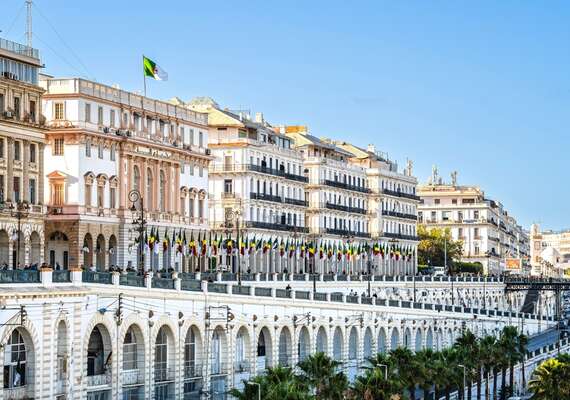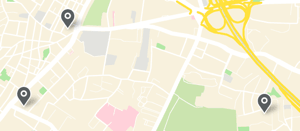Algiers City Guide

| Country: | |
| Known Names: | |
| Language: | |
| Population: | |
| Religion: | |
| Area Code: | |
| Currency: | |
| Time Zone: | |
| Visa: | |
| Consulate: |
General Information / Guide
Algiers, the capital of Algeria, is a city rich in history, culture, and architectural beauty. Located on the Mediterranean coast, this vibrant metropolis is often referred to as "Alger la Blanche" (Algiers the White) due to its stunning whitewashed buildings. Algiers offers a fascinating blend of the old and new, with its ancient Casbah, a UNESCO World Heritage site, standing in contrast to the modern boulevards and French colonial architecture. Visitors to Algiers can explore its historic sites, bustling markets, and seaside promenades, all while enjoying the city's unique Mediterranean charm.
Climate / Weather / When to Go
Algiers enjoys a Mediterranean climate, characterized by hot, dry summers and mild, wet winters. The best time to visit is during the spring (April to June) and autumn (September to November), when the weather is pleasantly warm and ideal for sightseeing. Summers (June to August) can be quite hot, with temperatures ranging from 25°C to 32°C, making it perfect for beach activities. Winters (December to February) are mild, with temperatures between 10°C and 18°C, and while it can be rainy, it’s still a good time to explore the city’s cultural attractions.
How to Get There
Houari Boumediene Airport (Algiers International Airport), located about 17 kilometers southeast of the city center, is the main gateway to Algiers. The airport offers numerous international and domestic flights. Transportation options from the airport to the city include taxis, airport shuttles, and car rentals. Algiers is well-connected by road, and the city’s public transportation system, including buses, trams, and the metro, provides reliable and affordable options for getting around.
Food / Restaurants / What to Eat and Drink
Algiers' culinary scene is a delightful reflection of its rich history and diverse influences. Must-try dishes include couscous, the national dish, often served with lamb, vegetables, and chickpeas, and chakhchoukha, a hearty stew made with flatbread, meat, and spices. For fine dining, visit restaurants like Le Dauphin and La Maison Blanche. For a more casual experience, explore the local eateries and street vendors in the Casbah, where you can sample traditional dishes like mechoui (roast lamb) and makroud (date-filled pastry). Don’t miss out on trying a glass of Algerian mint tea or a cup of strong coffee, both staples of the local diet.
Important Places / Places to Visit
- The Casbah of Algiers: A historic labyrinth of narrow streets, ancient houses, and significant landmarks, offering a glimpse into Algiers' past.
- Notre-Dame d'Afrique: A stunning basilica perched on a cliff overlooking the Mediterranean, known for its beautiful architecture and panoramic views.
- The Martyrs' Memorial (Maqam Echahid): A towering monument commemorating the Algerian War of Independence, offering both historical insight and a great view of the city.
- The Bardo National Museum of Prehistory and Ethnography: A museum housed in a former Ottoman palace, showcasing Algeria’s rich cultural and historical heritage.
- The Botanical Garden of Hamma: A lush, green oasis in the city, perfect for a relaxing stroll among exotic plants and trees.
- Algiers Central Post Office: A striking example of Moorish Revival architecture, this building is one of the city’s most iconic landmarks.
What to Do
Begin your exploration at the Casbah, where you can wander through its maze of alleys and discover centuries-old mosques and palaces. Visit the Notre-Dame d'Afrique for breathtaking views of the Mediterranean and to admire its beautiful architecture. Learn about Algeria’s history at the Martyrs' Memorial and the Bardo Museum. For a relaxing break, spend some time at the Botanical Garden of Hamma, or stroll along the seaside promenade at the Port of Algiers. Don’t forget to visit the Algiers Central Post Office, an architectural gem, and explore the vibrant markets for a taste of local life.
Nightlife / Bars / Entertainment
Algiers offers a more subdued nightlife compared to other major cities, but there are still plenty of places to enjoy an evening out. The city’s cafes are popular gathering spots, where locals sip coffee and mint tea while chatting with friends. For a more lively experience, visit the hotels and restaurants in the city’s western suburbs, such as Hydra and El Biar, where you’ll find stylish bars and lounges. The city also hosts cultural performances and events at venues like the National Theatre of Algiers and the Opera of Algiers, offering a taste of Algerian music, dance, and theater.
Shopping / What to Buy
Algiers offers a mix of traditional markets and modern shopping centers. The Casbah is the best place to shop for traditional crafts, including carpets, ceramics, and jewelry. The Souk El-Harrach is another popular market, known for its wide variety of goods, from spices to textiles. For more contemporary shopping, visit the Bab Ezzouar Mall or the City Center Shopping Mall, where you can find international brands and local boutiques. Don’t forget to pick up some Algerian olive oil, dates, or a beautifully crafted tagine as a souvenir.
Festivals/ Events
Algiers International Book Fair (October/November): One of the largest book fairs in Africa, attracting authors, publishers, and book lovers from around the world.
National Independence Day (July 5): A major national holiday marked by parades, fireworks, and celebrations across the city.
International Festival of Classical Music (December): A cultural event featuring performances by classical musicians from Algeria and around the world.
Algiers Film Festival (November): Celebrating the art of cinema with screenings of Algerian and international films, along with workshops and discussions.
Holidays / Festivals / Important Days
1 January: New Year’s Day - Celebrated with public festivities and family gatherings.
1 May: Labour Day - A public holiday with parades and events honoring workers.
5 July: Independence Day - Celebrating Algeria’s independence from France with nationwide festivities.
1 November: Revolution Day - Marking the start of the Algerian War of Independence, celebrated with various events.
25 December: Christmas Day - Although not widely observed, it is celebrated by the Christian community in Algiers.
Things to Pay Attention to / Important Information
Algiers is a city with a rich cultural and religious heritage, so it’s important to dress modestly, particularly when visiting religious sites. The city is generally safe, but it’s advisable to be cautious with your belongings in crowded areas and to use official taxis or public transportation. Algiers is a cash-based society, so carrying some local currency (Algerian dinar) is recommended. The local language is Arabic, but French is widely spoken, especially in more formal settings. Respect local customs and enjoy the warm hospitality of the Algerian people.
Transportation
Algiers has an extensive public transportation system, including buses, trams, and a metro, making it easy to get around the city. The city’s metro system, though relatively new, is efficient and connects major areas. Taxis are also widely available, but it's important to agree on the fare before starting your journey. The city’s traffic can be heavy, especially during rush hours, so plan your travel accordingly. For those looking to explore beyond Algiers, the city is well-connected by road to other parts of Algeria, and train services are available to several major cities.
